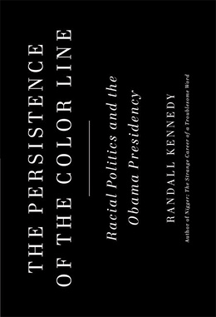By Carey Wall
Professor Kennedy’s title says it; the color line between blacks and whites in America did not dissolve in President Obama’s election. Kennedy asserts that he likes Obama and is glad he was elected, but he deplores the euphoria of those who argue this country has achieved a post-racial state. In his first four chapters he explores the realities of the 2008 campaign then moves to address blacks’ patriotism, the Sotomayor confirmation, and the future of American race relations. Besides election practices, he discusses such main black/white topics as affirmative action, police misconduct, and mass incarceration of young black men: “Nothing more increases avoidable criminalization of conduct, the administration of prosecution, and the severity of punishment.” Kennedy’s book is valuable especially as a sustained demonstration of patient, reasonable thought. Taking on the voluminous detail and commentary on the 2008 campaigns, primary, and general election, he judges what statements make sense and which do not. He distinguishes between what is right and what is wrong in writers’ uses of ideas and arguments. He discerns reasons for charges and omissions. He elicits complications of the full reality that have been omitted from arguments. He shows how statements are “susceptible to different interpretations.” He reminds readers what is missing in polemical arguments. He supports his assessments of whites’ and blacks’ pro and con responses to Obama in the 2008 campaign with myriad references. He devotes the whole of one chapter to sorting out what constitutes “playing the race card” in the 2008 elections and what doesn’t.
Kennedy evaluates President Obama’s record as well as voters’ and particularly whites’ behavior. He expresses some disappointment that Obama has not addressed whites’ continuing maintenance of the color line, but on the whole he accepts that the President is a consummate politician and will do what he has to do to be acceptable to enough whites to be elected and possibly reelected. He points out that whites are three-fourths of the electorate. Nonetheless, he is disappointed that Obama is not using the term “liberal” to promote his liberal policies and goals and thus helping to reverse the hold of decades of growing conservatism.
The old and continuing practices of whites continue, understandably, to annoy Kennedy. They/we are the perpetrators Obama leaves in the shadows when he speaks of blacks’ sad history in this country; he notes that in his now famous “race speech,” Obama uses the passive voice, “a passive voice that obscures the participation of whites, past and present, in the making, perpetuation, and exploitation of racial subordination. . . . But who have been the beneficiaries of those awful injustices? In Obama’s chronicle whites are strangely absent from [their] roles.” Change has occurred. In the last half century acceptance of mixed race marriages has increased notably. But that has not arrested ongoing, sustained attempts to maintain white dominance. Sentencing laws, for example, are not explicitly racial but have a racial effect.
Kennedy briefly views the not too distant future when whites will no longer constitute a majority, when no one racial group here will constitute a majority. He notes that Americans are divided over the racial regime they want to create, and we live in a current ambivalence and confusion over “what racial equality entails.”
Carey Wall (ΦBK, University of Michigan,1957) is a professor emerita of English and comparative literature at San Diego State University and a resident member of the Nu of California chapter of Phi Beta Kappa.




